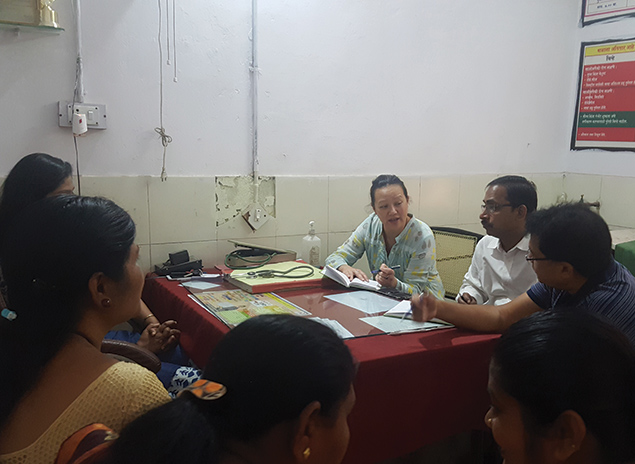Tuberculosis
Before COVID-19, tuberculosis (TB) was the world’s leading cause of death due to a single infectious agent. According to WHO’s 2019 estimate, 44 percent of the 9.96 million people with TB worldwide live in WHO’s egion. India accounts for more than one-quarter of the global burden. It is widely recognized that global TB efforts will only be successful if India’s TB control efforts succeed.
CDC worked to improve diagnosis, treatment, and monitoring of patients, while also supporting policy development and training.
In 1996, before becoming CDC director, Dr. Tom Frieden was assigned by CDC to WHO’s India country office to support GOI’s Revised National TB Control Program (RNTCP). Through WHO and in collaboration with India’s Ministry of Health and Family Welfare and the Indian Council of Medical Research, CDC worked to improve diagnosis, treatment, and monitoring of patients, while also supporting policy development and training. The multiagency team implemented a national laboratory network, enhanced transparent reporting of performance from every district in the country, and conducted research on a broad range of TB control issues. By 2002, RNTCP covered half of the country, with GOI commitments and plans to expand throughout India, address private sector involvement, and support prevention and control of multidrug-resistant TB (MDR-TB).

CDC staff explaining primary health center and community health workers about the role of health workers in CDC supported HAaLT-TB in Raipur, Chattisgarh, 2019. Photo credit: CDC India office

CDC staff with TB unit staff at the Pachpouli urban health centre developing a TB recording and reporting system in Nagpur, Maharashtra, 2019 Photo credit: CDC India office
CDC staff trains the Mumbai district TB officers and data entry operators on ELEVATE (Engaging Local Experts in Validating and Analyzing TB-data to End TB) in Mumbai, Maharashtra, 2019 Photo credit: CDC India office
Factors that contributed to the success of CDC-supported TB programs in India, include:
- Strengthened focus on TB infection prevention and control (IPC) and airborne infection control (AIC) practices in healthcare facilities
- Supported a multi-disciplinary AIC unit established by Municipal Corporation of Greater Mumbai that improved in 10 Mumbai wards; the model was also piloted in Chennai
- Launched a program to improve accuracy in TB testing and reporting
- Organized workshops to improve TB program performance
- Launched a MDR-TB ECHO clinic to support tele-mentoring by national experts, which was delivered to TB clinicians covering diagnosis, treatment, and management of MDR-TB, including the use of new oral drugs such as bedaquiline
- Expanded ECHO clinics for HIV/TB and medical colleges
- The National AIDS Control Organization (NACO) expanded the HIV/TB ECHO clinic to include ART staff from West Bengal and 8 states in Northeast India
- CDC supports NACO and the National TB Elimination Program in rolling out single-window services through ART centers to manage TB in PLHIV, including training of staff, intensive HIV/TB case finding, early diagnosis, testing, and HIV and TB treatment
- CDC supports TB prevention through increasing treatment of latent TB infection for PLHIV
CDC partners with the GOI through RNTCP. In Maharashtra, India’s second most populous state, CDC piloted prevention activities in IPC/AIC, diagnosing and treating latent TB infection, and improving diagnosis of TB. These activities are expanding beyond Maharashtra, in coordination with India’s National Tuberculosis Elimination Program (NTEP). IPC/AIC activities will be implemented in selected Antiretroviral therapy (ART) centers in the states of Maharashtra and Andhra Pradesh and will cascade in general health facilities and drug-resistant TB centers in districts from 10 states selected by NTEP.
CDC works with NTEP to accelerate treatment of latent TB infection in household contacts, healthcare workers, and other contacts using shorter, easier to complete treatment regimens. In the slum at Dharavi, considered one of Asia’s largest slums and located in Mumbai, CDC collaborates on early MDR-TB diagnosis, safe MDR-TB treatment and cure, and ensuring migrants receive uninterrupted MDR-TB treatment. CDC also works with NTEP to strengthen district-level capacity to harness use of local data for local strategies to fight TB in 11 states across India’s five regions. develops methods to ensure accuracy for TRUNAT, a new rapid molecular TB test that will replace almost 2,000 sputum microscopy facilities across the country.